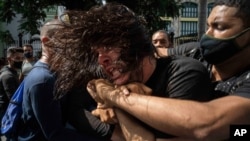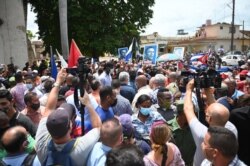Thousands of Cubans protested Sunday in the largest anti-government demonstrations in decades as people expressed frustrations with an economic crisis and the government’s response to the coronavirus pandemic.
Protesters chanted slogans calling for freedom, liberty and unity as they marched in the capital, Havana, until police eventually broke up the march while making some arrests.
Demonstrators turned out in other parts of the country, including in San Antonio de los Banos, near Havana, voicing their anger about long lines for food, cuts in electricity and trouble with the supply of medicine.
Cuba is also experiencing its worst phase of the coronavirus pandemic, with health officials reporting a record 6,923 new infections and 47 deaths on Sunday.
Cuban President Miguel Díaz-Canel visited San Antonio de los Banos on Sunday and acknowledged that people had turned out to express their frustration but blamed the unrest on what he called “a Cuban-American mafia” social media campaign.
He also blamed the United States, which under former President Donald Trump reimposed a trade embargo on Cuba, saying that sanctions were responsible for medicine shortages in the country. Diaz-Canel called for his supporters to confront “provocations,” and there were smaller pro-government demonstrations.
U.S. President Joe Biden expressed support for the Cuban people in a statement Monday, underscoring their right to peaceful protest.
“The United States calls on the Cuban regime to hear their people and serve their needs at this vital moment rather than enriching themselves,” the president said.
A day earlier, officials from the U.S. State Department tweeted their support for peaceful protests against medicine shortages and other issues.
“Peaceful protests are growing in #Cuba as the Cuban people exercise their right to peaceful assembly to express concern about rising COVID cases/deaths & medicine shortages,” said Julie Chung, acting assistant secretary for state for Western Hemisphere affairs.
Sharing Chung’s tweet, U.S. national security adviser Jake Sullivan added in his own tweet that the United States “supports freedom of expression and assembly across Cuba and would strongly condemn any violence or targeting of peaceful protesters who are exercising their universal rights.”
Carlos Fernandez de Cossio, the top Cuban official in charge of relations with the United States, accused the U.S. State Department and its officials of “promoting social and political instability in Cuba,” and said they should “avoid expressing hypocritical concern for a situation they have been betting on.”
“Cuba is and will continue to be a peaceful country, contrary to the U.S.,” he tweeted Sunday.
Some information for this report came from the Associated Press, AFP and Reuters.






